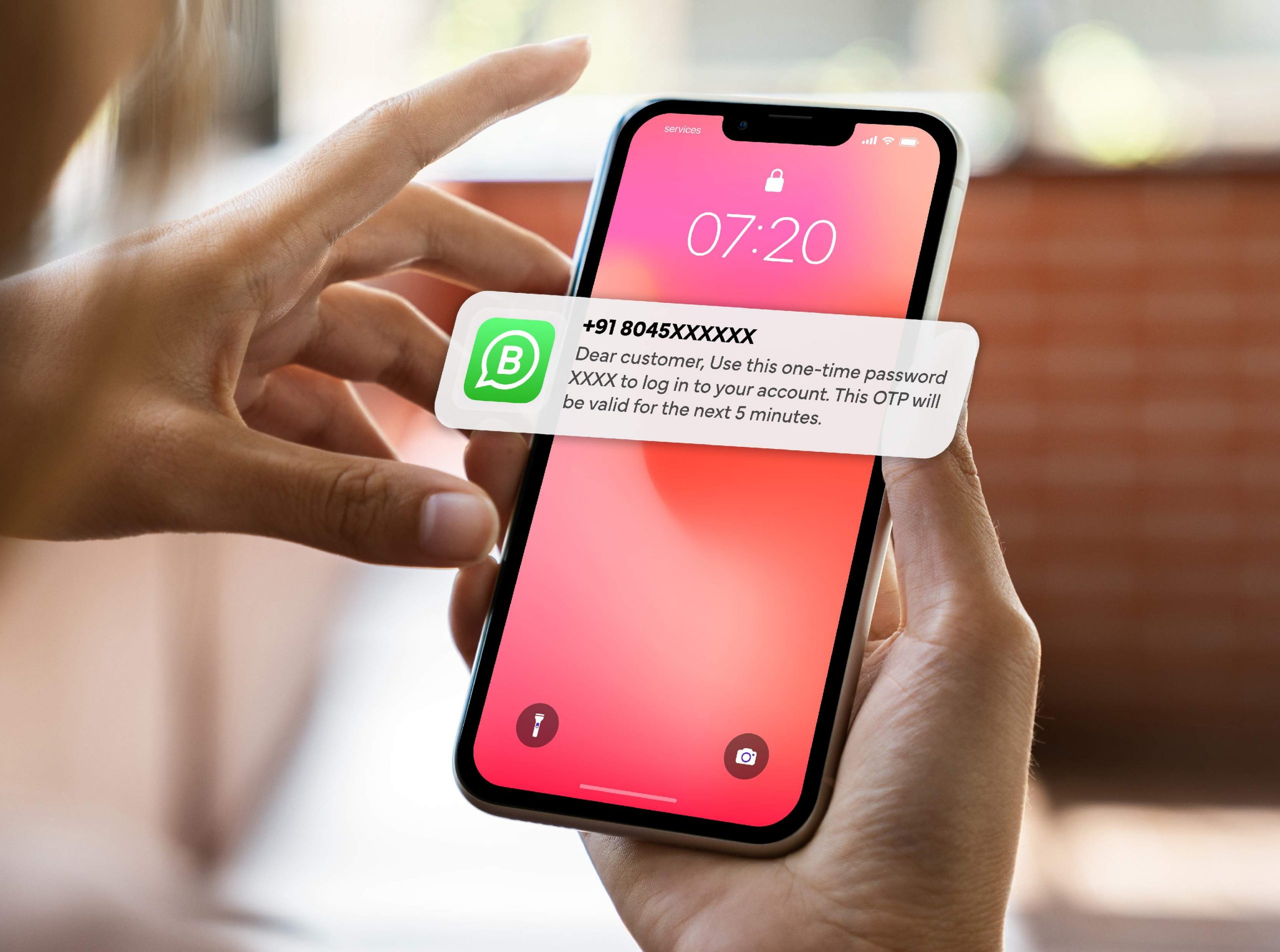How to Send OTPs on WhatsApp – Complete Guide 2025
-
June 22, 2023
-
6 min read

You have probably received a one-time password (OTP) while signing into your favourite app or confirming a payment online. OTPs have become a routine part of digital life by helping to verify identity and secure transactions within seconds. Traditionally delivered via SMS, these codes now appear across multiple platforms, including WhatsApp. As communication habits evolve, so do the methods businesses use to reach their users quickly and securely.
This guide takes a closer look at how businesses can send OTPs using WhatsApp. From setup requirements to message automation and security handling, you will find a step-by-step breakdown of the entire process. Whether you are exploring new channels or refining existing ones, this resource will help you navigate WhatsApp-based OTP delivery.
WhatsApp OTP vs SMS OTP: What’s the Difference?
Before choosing the right channel for delivering OTPs, it’s crucial to understand how WhatsApp OTP compares with traditional SMS OTP.
Message Delivery & Read Rates
SMS enjoys wide network compatibility, but delivery inconsistencies and spam filtering often hinder its effectiveness. In contrast, WhatsApp OTP services offer significantly higher delivery rates and real-time read receipts, ensuring that users receive and view their authentication messages promptly.
Security & Encryption
SMS lacks end-to-end encryption, leaving messages vulnerable during transmission. WhatsApp messages, on the other hand, are protected by robust end-to-end encryption protocols. This makes WhatsApp a more secure medium for sending sensitive authentication information, such as OTPs.
User Experience & Engagement
SMS interfaces are simple but lack interactive elements. WhatsApp supports rich media, instant reply options, and clickable buttons. This enhanced experience increases engagement, especially when OTPs are part of a broader verification or onboarding process. This is why many prefer to send OTP on WhatsApp and not via SMS.
Cost Efficiency and ROI
SMS campaigns are subject to telecom taxes and charges that vary across regions. WhatsApp OTP solutions, offered via the Airtel’s IQ WhatsApp Business API, provide cost efficiency with better visibility, fewer failed deliveries, and higher conversion, yielding improved return on investment.
Why Use WhatsApp for Sending OTPs?
Sending OTPs via WhatsApp is usually preferred over SMS OTP because:
End-to-End Encryption & Authentication
With WhatsApp, every message is encrypted from the sender to the recipient. For OTPs, this ensures that sensitive verification codes remain private and inaccessible to third parties.
High User Adoption & Familiarity
WhatsApp has more than 2 billion active users globally. People use it daily, making them more likely to trust messages received on the platform. Businesses leveraging WhatsApp OTPs can benefit from this high familiarity and trust level.
Global Reach with Lower Latency
WhatsApp operates over the internet, ensuring faster message delivery compared to SMS, which relies on mobile networks. It reduces latency, especially in areas where SMS may face bottlenecks.
Enhanced Interactivity & Personalisation
Using the WhatsApp API, businesses can personalise OTP interactions. Chatbots can greet users by name, contextualise the OTP request, and even route users to live agents if needed.
Increased Trust & Brand Recall
A verified WhatsApp corporate account boosts brand credibility. OTPs sent from a branded profile are less likely to be ignored, enhancing customer trust and recall.
How to Send OTPs via WhatsApp: Step-by-Step
Look at the steps in detail to understand how you can quickly send OTPs via WhatsApp securely:
Prerequisites: WhatsApp Business API & Verification
To begin, businesses must apply for access to the WhatsApp Business API through a trusted provider like Airtel IQ. This involves verification and approval from WhatsApp. Once approved, a unique WhatsApp number is issued along with a verified business profile that builds customer trust and improves message visibility.
Setting Up Messaging Flows with Automation Tools
Next, integration with backend systems enables automated messaging. Developers create logic to generate unique, time-bound OTPs and define workflows that trigger WhatsApp messages when users initiate actions like logins or transactions. Automation tools streamline these processes, supporting chatbot integration and two-way interactions if needed.
Generating & Sending Secure OTPs
After the setup, OTPs are generated through secure algorithms and dispatched via encrypted WhatsApp channels. With Airtel IQ, businesses gain access to delivery insights, read receipts, and fallback options. If delivery over WhatsApp fails, the message can automatically reroute via SMS or voice, ensuring the OTP reaches the user.
Handling Delivery Reports and User Input
With WhatsApp, businesses receive delivery and read receipts instantly. Users can also reply directly to the message for additional verification or support. These inputs can be routed to a human agent or a WhatsApp chatbot for contextual handling.
Key Benefits of WhatsApp OTP Verification for Businesses
There are multiple advantages of choosing WhatsApp as OTP receiver for businesses.
Improved Conversion Rates
The instant delivery and high visibility of WhatsApp messages result in faster user actions. OTPs sent via WhatsApp experience higher conversion, especially during signups and payments, compared to traditional SMS OTPs.
Reduced Fraud & Enhanced User Trust
WhatsApp messages come with brand verification, which makes phishing and spoofing extremely difficult. Airtel’s solution includes features like intelligent fallback and context-aware messaging to mitigate risk and bolster user trust.
Seamless Multi-Device Accessibility
Unlike SMS, which is often tied to a single device, WhatsApp can be accessed from multiple devices, ensuring that users receive OTPs even when switching phones or working on desktop environments.
Best Practices for Implementing WhatsApp OTPs
Even though WhatsApp OTPs are highly secure, it is important to follow smart financial habits, such as:
- Use a Verified Business Profile: Make sure your WhatsApp number is officially verified to build trust.
- Keep OTP Messages Short and Clear: Highlight the code and its purpose to avoid confusion.
- Enable Intelligent Channel Fallback: If WhatsApp delivery fails, reroute the message using the SMS API.
- Secure Your Backend Systems: Implement rate limiting and expiry mechanisms to prevent OTP abuse.
- Test Across Devices and Regions: Ensure delivery speed and format consistency globally.
- Integrate Analytics: Monitor delivery, read, and conversion rates to optimise campaigns.
Conclusion: Is WhatsApp OTP the Future of Authentication?
By now, you must have understood how to send OTP on WhatsApp easily. Sending OTPs on WhatsApp offers businesses a faster, more secure, and highly engaging alternative to SMS OTPs. With features like end-to-end encryption, verified business profiles, and quick delivery with read receipts, WhatsApp boosts the user verification experience.
It also supports automation, fallback mechanisms, and contextual interactions that SMS simply can’t match. As customer expectations evolve, businesses must adopt smarter communication tools to stay ahead.
For organisations ready to modernise their OTP workflows, Airtel IQ provides a powerful, scalable, and telco-grade WhatsApp Business API solution. From seamless onboarding to reliable message delivery, Airtel ensures a secure and efficient OTP ecosystem built for the future. Switch to Airtel and unlock smarter customer engagement today.
 Share
Share









